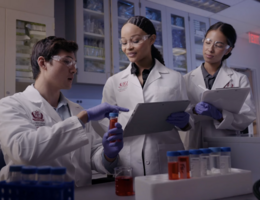

A concerning increase in the occurrence of colorectal cancer in younger adults is prompting calls for earlier screening and awareness campaigns.
While genetic factors play a significant role, lifestyle choices such as obesity and lack of exercise also contribute to this increase, according to oncologist Chung-Tsen Hsueh, MD, PhD. Consequently, US health officials updated guidelines for colorectal cancer screenings, with recommendations now starting at 45 year’s old rather than 50.
Notable statistics from the American Cancer Society:
- Colorectal cancer is the third most commonly diagnosed cancer in both men and women in the United States.
- The lifetime risk of developing colorectal cancer is about 1 in 23 for men and 1 in 25 for women
- Health experts estimate about 106,000 new cases of colon cancer and 46,000 new cases of rectal cancer will be diagnosed in 2024
- Colorectal cancer incidence rates have been rising among adults under 50 in the United States.
The annual diagnosis rate of colon or rectal cancer has declined since the mid-1980s, largely attributed to increased screening efforts and lifestyle changes. Between 2011 and 2019, incidence rates witnessed a gradual decrease of 1% annually. However, this downward trajectory predominantly pertains to older demographics. Conversely, health experts have seen a consistent annual increase among individuals under 55 years old in rates ranging from 1% to 2% since the mid-1990s.
Advancements
Advancements in genetic testing technology have revolutionized cancer medicine, allowing for the simultaneous evaluation of 80-100 genes associated with hereditary cancer syndromes in blood sample, saliva spit, or cells from oral cavity. This comprehensive approach enables healthcare providers to identify genetic mutations that may increase the risk of developing various cancers, including colorectal, breast and ovarian cancer.
Furthermore, genetic testing in cancer plays a crucial role in personalized treatment plans. Hsueh explains how identifying specific genetic mutations can guide treatment decisions, such as determining the benefit of targeted therapy and immunotherapy. By tailoring treatment strategies to individual genetic profiles, healthcare providers can optimize patient outcomes while minimizing unnecessary interventions and toxicities.
Genetic testing also extends beyond the individual patient to their family members. Hsueh stresses the importance of informing relatives about positive genetic test results, as they may be eligible for free testing and early intervention measures.
In addition to genetic testing, emerging screening methods, such as blood and stool DNA tests, offer non-invasive alternatives to colonoscopies and can identify more patients at risk than traditional stool occult blood test. These advancements will encourage more individuals to undergo screening, ultimately leading to earlier detection and treatment.
Read: Genetic testing offers patients speedy diagnosis, individualized cancer therapies
Genetic testing in a family unit
Upon receiving concerning results from a genetic panel, it's also important to seek familial predispositions to certain conditions. For instance, if an individual undergoes genetic testing for colorectal cancer and receives a positive result indicating a hereditary predisposition, Hsueh strongly recommends immediate family members, like parents, siblings, and children, also undergo testing. This proactive approach enables early detection and intervention if they also carry the genetic mutation, potentially saving lives through timely preventive measures or screenings.
However, Hsueh emphasizes that genetic testing is not reserved solely for younger individuals with cancer or those with a family history of colorectal cancer. He says approximately 10-15% of colorectal cancer cases are attributed to genetic factors, prompting the routine referral of patients with history of colorectal cancer for genetic testing.
“By extending the scope of genetic testing beyond the individual with positive result to encompass their family network, it establishes a proactive framework for managing inherited health risks and promoting overall well-being within the family unit,” Hsueh says.
The cancer genetic testing laboratory within the Department of Pathology also serves to support the Loma Linda University Cancer Center. The Cancer Center is dedicated to providing patients with the best opportunity to face and overcome cancer. To learn more about the resources offered to cancer patients, visit its website at lluh.org/cancer-center.


